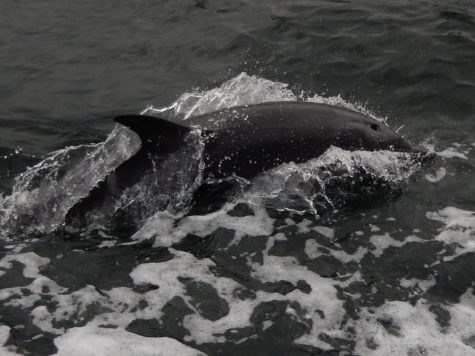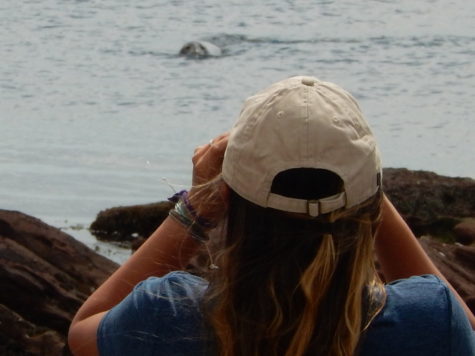Marine Mammal Biology & Conservation Course
- Location: Millport
- Tutor: Dominic McCafferty, Anna McGregor, Chris Parsons and Jack Lucas
- Dates: Thursday 11 July 2019 to Thursday 18 July 2019
- Level: Intermediate


Course cost
- RESIDENT(SOLE OCCUPANCY): £731 (includes food and accomodation for the course duration)
- RESIDENT(SHARED ROOM): £682 (includes food and accomodation for the course duration)
- NON-RESIDENT: £642
To register please visit: https://www.field-studies-council.org/individuals-and-families/courses/2019/mil/marine-mammals-81596.aspx
This field course is an intensive, comprehensive yet thoroughly enjoyable introduction to studying marine mammals. With dedicated vessel surveys, lab practicals, shore work and lectures that cover the whole spectrum of marine mammal science; this course is a one-of-kind experience into the world of whales, dolphins and seals led by experienced professionals. Their biology, physiology, ecology, conservation and sampling strategies will be detailed over the course by experts in different fields, with specific focus on practical sessions where data will be collected and analysed. These practicals include: a line-transect survey for birds and cetaceans, a seal colony behavioural study, an acoustic workshop, an otter diet analysis and a land-based observation for megafauna. The Clyde is home to a wide variety of marine megafauna and is the perfect setting for observing mammals and birds in the wild. The use of the marine station’s research vessel RV Actinia, state-of-the-art lab facilities, comfortable lecture theatres and specialist equipment are an integral part of this course, along with the specialisms of the teaching staff involved.
Please note this course is aimed at those who are currently undertaking, or have recently undertaken, a degree in a relevant scientific discipline or those pursuing post-graduate studies. The course currently hosts regular undergraduate cohorts from the Universities of Glasgow and Stirling, and is frequently attended by visiting international students.
Extra Nights
If you are interested in staying at the Centre for additional nights, before or after the course, please contact the Centre for availability and costs which start from £25 for B&B, or £40 full board (we can confirm B&B availability 4 weeks prior to the course). Sunday rate £35.
Partner Rate
For those paying the sole occupancy price, we are offering our guests a special rate for those who would like a twin room for them and their partner not enrolled on an FSC course, at £35 per night for dinner, bed and breakfast.
US students
If you are based in the US and wish to take the course and/or wish to take the course for US college (undergraduate or graduate credit; 4.0 credit hours) please contact Dr Chris Parsons (ecm-parsons@earthlink.net) for information on how to get to the field station and/or obtaining US credit.
Tutors
Dr Dominic McCafferty joined the University of Glasgow in 1999 and since then has undertaken a range of studies on vertebrates with a particular interest in physiological ecology. His current research deals with cold adaptation, behavioural thermoregulation and stress-related temperature responses of birds and mammals. Dominic is Editor in Chief of Ibis (https://www.bou.org.uk/ibis/) and an Editorial Board member for the Journal of Thermal Biology (https://www.journals.elsevier.com/journal-of-thermal-biology).
Dr Chris Parsons has been involved in whale and dolphin research for over two decades and has been involved in projects on every continent. Chris was Associate Professor at George Mason University as well as the Director of their undergraduate program in environmental science, and is currently a research affilate at Glasgow University. In addition, he has published over 170 scientific papers and book chapters and has written a textbook on marine mammal biology & conservation (the textbook for the course) and co-edited a book on marine wildlife conflict resolution. He’s the Executive Editor of the Journal of Environmental Studies and Sciences, an Associate Editor of Frontiers in Marine Science. and on the editorial board of Tourism in Marine Environments.
Dr Anna McGregor, a lecturer at Glasgow University, with a research background focussed on the use of sound in marine mammals and the potential for anthropogenic noise to cause physiologically relevant disturbance. More recently, Anna’s work has included studying the effects of noise on other animals as well as those in freshwater environments, and the use of acoustics to monitor cryptic animals in a number of habitats.
Jack Lucas is a knowledgeable marine biologist having conducted marine mammal research in four countries, and with a degree in the subject. He is also a qualified Passive Acoustic Monitoring operator and Marine Mammal Observer. He has a passion for birds and marine organisms, and works on Cumbrae as an FSC tutor for much of the year so knows the local sites well.


